初二英语上知识点资料
- 格式:doc
- 大小:99.00 KB
- 文档页数:28
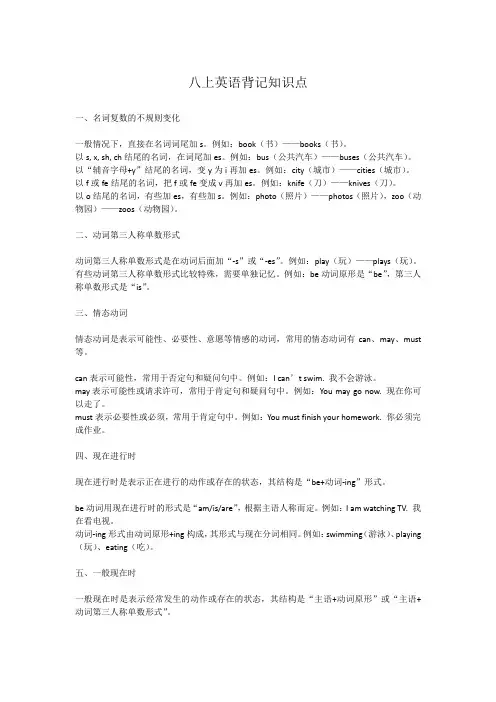
八上英语背记知识点一、名词复数的不规则变化一般情况下,直接在名词词尾加s。
例如:book(书)——books(书)。
以s, x, sh, ch结尾的名词,在词尾加es。
例如:bus(公共汽车)——buses(公共汽车)。
以“辅音字母+y”结尾的名词,变y为i再加es。
例如:city(城市)——cities(城市)。
以f或fe结尾的名词,把f或fe变成v再加es。
例如:knife(刀)——knives(刀)。
以o结尾的名词,有些加es,有些加s。
例如:photo(照片)——photos(照片),zoo(动物园)——zoos(动物园)。
二、动词第三人称单数形式动词第三人称单数形式是在动词后面加“-s”或“-es”。
例如:play(玩)——plays(玩)。
有些动词第三人称单数形式比较特殊,需要单独记忆。
例如:be动词原形是“be”,第三人称单数形式是“is”。
三、情态动词情态动词是表示可能性、必要性、意愿等情感的动词,常用的情态动词有can、may、must 等。
can表示可能性,常用于否定句和疑问句中。
例如:I can’t swim. 我不会游泳。
may表示可能性或请求许可,常用于肯定句和疑问句中。
例如:You may go now. 现在你可以走了。
must表示必要性或必须,常用于肯定句中。
例如:You must finish your homework. 你必须完成作业。
四、现在进行时现在进行时是表示正在进行的动作或存在的状态,其结构是“be+动词-ing”形式。
be动词用现在进行时的形式是“am/is/are”,根据主语人称而定。
例如:I am watching TV. 我在看电视。
动词-ing形式由动词原形+ing构成,其形式与现在分词相同。
例如:swimming(游泳)、playing (玩)、eating(吃)。
五、一般现在时一般现在时是表示经常发生的动作或存在的状态,其结构是“主语+动词原形”或“主语+动词第三人称单数形式”。
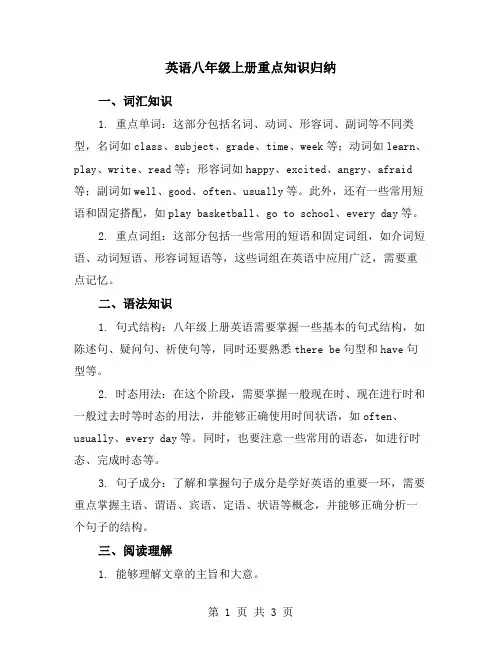
英语八年级上册重点知识归纳一、词汇知识1. 重点单词:这部分包括名词、动词、形容词、副词等不同类型,名词如class、subject、grade、time、week等;动词如learn、play、write、read等;形容词如happy、excited、angry、afraid 等;副词如well、good、often、usually等。
此外,还有一些常用短语和固定搭配,如play basketball、go to school、every day等。
2. 重点词组:这部分包括一些常用的短语和固定词组,如介词短语、动词短语、形容词短语等,这些词组在英语中应用广泛,需要重点记忆。
二、语法知识1. 句式结构:八年级上册英语需要掌握一些基本的句式结构,如陈述句、疑问句、祈使句等,同时还要熟悉there be句型和have句型等。
2. 时态用法:在这个阶段,需要掌握一般现在时、现在进行时和一般过去时等时态的用法,并能够正确使用时间状语,如often、usually、every day等。
同时,也要注意一些常用的语态,如进行时态、完成时态等。
3. 句子成分:了解和掌握句子成分是学好英语的重要一环,需要重点掌握主语、谓语、宾语、定语、状语等概念,并能够正确分析一个句子的结构。
三、阅读理解1. 能够理解文章的主旨和大意。
2. 能够理解文章的细节和事实。
3. 能够根据上下文猜测生词的意思。
4. 能够理解作者的观点和态度。
5. 不断提高阅读速度和理解能力。
四、写作知识1. 写作技巧:掌握一些基本的写作技巧,如正确的语法、拼写和标点符号,以及正确的文章结构等。
2. 写作实践:通过不断的写作练习,提高自己的写作能力。
除此之外,八年级上册英语还需要注意以下几个方面:1. 听力训练:每天坚持进行听力训练,提高听力理解能力。
2. 口语表达:鼓励学生多进行口语练习,提高口语表达能力。
在口语表达中要注意语音、语调和语速等方面的问题,同时也要注意表达的准确性和得体性。
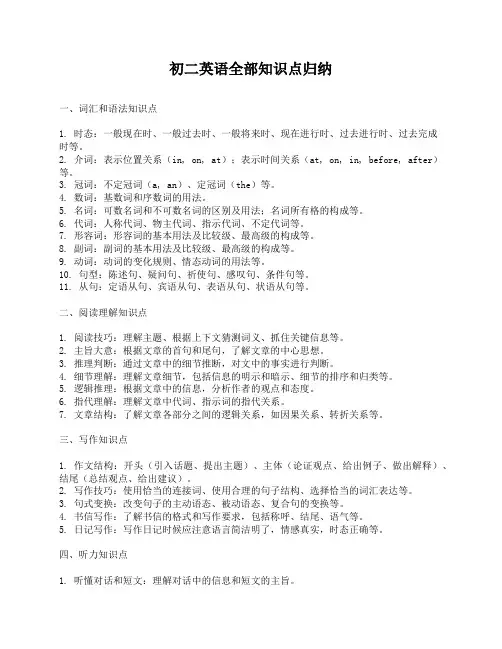
初二英语全部知识点归纳一、词汇和语法知识点1. 时态:一般现在时、一般过去时、一般将来时、现在进行时、过去进行时、过去完成时等。
2. 介词:表示位置关系(in, on, at);表示时间关系(at, on, in, before, after)等。
3. 冠词:不定冠词(a, an)、定冠词(the)等。
4. 数词:基数词和序数词的用法。
5. 名词:可数名词和不可数名词的区别及用法;名词所有格的构成等。
6. 代词:人称代词、物主代词、指示代词、不定代词等。
7. 形容词:形容词的基本用法及比较级、最高级的构成等。
8. 副词:副词的基本用法及比较级、最高级的构成等。
9. 动词:动词的变化规则、情态动词的用法等。
10. 句型:陈述句、疑问句、祈使句、感叹句、条件句等。
11. 从句:定语从句、宾语从句、表语从句、状语从句等。
二、阅读理解知识点1. 阅读技巧:理解主题、根据上下文猜测词义、抓住关键信息等。
2. 主旨大意:根据文章的首句和尾句,了解文章的中心思想。
3. 推理判断:通过文章中的细节推断,对文中的事实进行判断。
4. 细节理解:理解文章细节,包括信息的明示和暗示、细节的排序和归类等。
5. 逻辑推理:根据文章中的信息,分析作者的观点和态度。
6. 指代理解:理解文章中代词、指示词的指代关系。
7. 文章结构:了解文章各部分之间的逻辑关系,如因果关系、转折关系等。
三、写作知识点1. 作文结构:开头(引入话题、提出主题)、主体(论证观点、给出例子、做出解释)、结尾(总结观点、给出建议)。
2. 写作技巧:使用恰当的连接词、使用合理的句子结构、选择恰当的词汇表达等。
3. 句式变换:改变句子的主动语态、被动语态、复合句的变换等。
4. 书信写作:了解书信的格式和写作要求,包括称呼、结尾、语气等。
5. 日记写作:写作日记时候应注意语言简洁明了,情感真实,时态正确等。
四、听力知识点1. 听懂对话和短文:理解对话中的信息和短文的主旨。
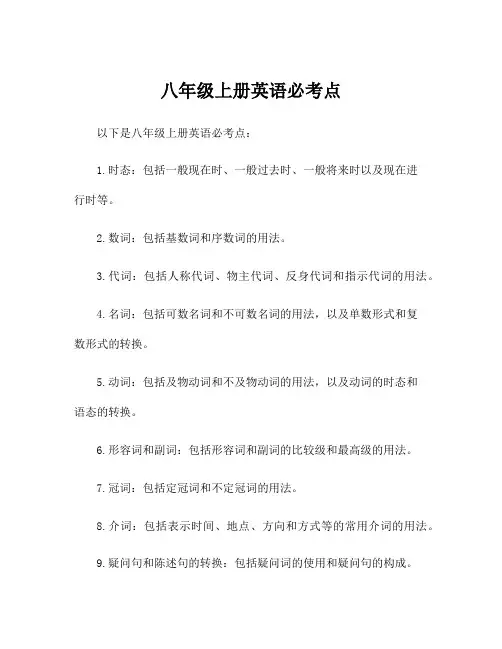
八年级上册英语必考点
以下是八年级上册英语必考点:
1.时态:包括一般现在时、一般过去时、一般将来时以及现在进
行时等。
2.数词:包括基数词和序数词的用法。
3.代词:包括人称代词、物主代词、反身代词和指示代词的用法。
4.名词:包括可数名词和不可数名词的用法,以及单数形式和复
数形式的转换。
5.动词:包括及物动词和不及物动词的用法,以及动词的时态和
语态的转换。
6.形容词和副词:包括形容词和副词的比较级和最高级的用法。
7.冠词:包括定冠词和不定冠词的用法。
8.介词:包括表示时间、地点、方向和方式等的常用介词的用法。
9.疑问句和陈述句的转换:包括疑问词的使用和疑问句的构成。
10.宾语从句和定语从句:包括宾语从句和定语从句的引导词和构成。
11.情态动词:包括can、could、may、might、must、shall、should、will、would、have to和need的用法。
12.倒装句:包括将助动词、情态动词或系动词放在主语之前的构成和使用。
13.同义词和反义词:包括常见的同义词和反义词的词汇搭配和用法。
以上是八年级上册英语必考点的一些内容,具体还需根据教材内容和学校要求进行复习。
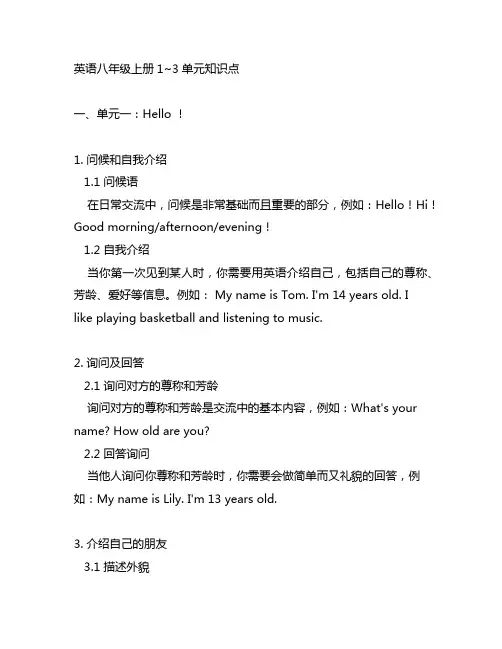
英语八年级上册1~3单元知识点一、单元一:Hello !1. 问候和自我介绍1.1 问候语在日常交流中,问候是非常基础而且重要的部分,例如:Hello!Hi!Good morning/afternoon/evening!1.2 自我介绍当你第一次见到某人时,你需要用英语介绍自己,包括自己的尊称、芳龄、爱好等信息。
例如: My name is Tom. I'm 14 years old. Ilike playing basketball and listening to music.2. 询问及回答2.1 询问对方的尊称和芳龄询问对方的尊称和芳龄是交流中的基本内容,例如:What's your name? How old are you?2.2 回答询问当他人询问你尊称和芳龄时,你需要会做简单而又礼貌的回答,例如:My name is Lily. I'm 13 years old.3. 介绍自己的朋友3.1 描述外貌在介绍朋友时,需要用英语描述对方的外貌特征,例如:He has short black h本人r and big blue eyes.3.2 描述性格和爱好介绍朋友的性格及爱好也是非常重要的部分,例如:She is outgoing and she likes singing and dancing.二、单元二:My Day1. 时间表及日常活动1.1 表述时间在日常生活中,我们需要学会用英语表达时间,例如:It's seven o'clock. It's time for breakfast.1.2 描述日常活动描述日常活动是非常重要的,通过用英语描述,可以让对方更好地了解你的生活,例如:I get up at six thirty in the morning.2. 描述一天的安排2.1 早上在英语中,描述早上的活动需要用适当的词汇和句子结构,例如:In the morning, I usually have breakfast at seven o'clock.2.2 中午描述中午的安排也需要合适的表述方式,例如:At noon, I have lunch with my classmates.2.3 下午形容下午的活动也需要用英语来描述,例如:In the afternoon, I play basketball with my friends after school.3. 时间状语及延续性动词3.1 时间状语在描述一天的安排时,时间状语能让你的描述更加清晰和连贯,例如:At eight in the evening, I do my homework.3.2 延续性动词在描述日常活动时,延续性动词的使用极为重要,能够更准确地表达你的日常习惯,例如:I'm reading a book at the moment.三、单元三:At Home1. 家庭成员及家庭关系1.1 家庭成员描述家庭成员时,需要用英语进行表述,例如:My mother is a teacher and my father is a doctor.1.2 家庭关系通过用英语描述家庭成员之间的关系,能够更好地展现出你的家庭情况,例如:My parents are very kind to me and my sister.2. 描述家中的布置2.1 房间及家具通过用英语描述家中的布置,能够让对方更好地了解你的家庭环境,例如:There is a bed, a desk and a ch本人r in my room.2.2 家居摆设描述家居摆设也是非常关键,通过合适的表述,可以给对方留下深刻的印象,例如:There are some photos on the wall and some plants on the table.3. 家庭活动及家务3.1 家庭活动描述家庭活动时需要用英语进行表述,例如:We often watch TV together on weekends.3.2 家务描述家务活动同样需要用合适的方式表述,例如:I help my mom with the cooking every evening.以上是英语八年级上册1~3单元的部分知识点,希望同学们能够认真学习,掌握这些知识,提高英语的表达能力。
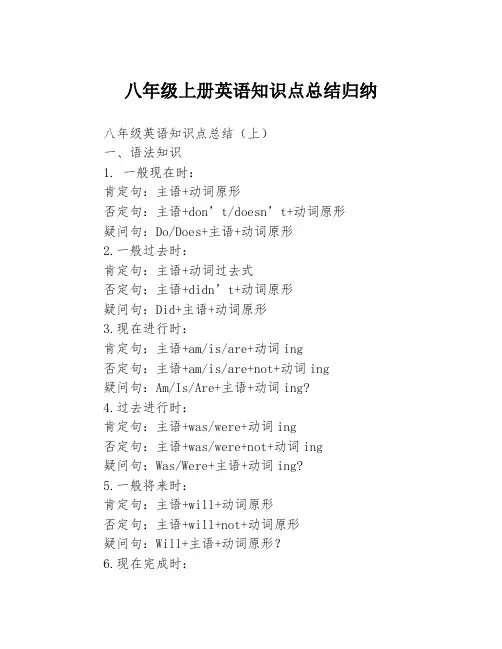
八年级上册英语知识点总结归纳八年级英语知识点总结(上)一、语法知识1. 一般现在时:肯定句:主语+动词原形否定句:主语+don’t/doesn’t+动词原形疑问句:Do/Does+主语+动词原形2.一般过去时:肯定句:主语+动词过去式否定句:主语+didn’t+动词原形疑问句:Did+主语+动词原形3.现在进行时:肯定句:主语+am/is/are+动词ing否定句:主语+am/is/are+not+动词ing疑问句:Am/Is/Are+主语+动词ing?4.过去进行时:肯定句:主语+was/were+动词ing否定句:主语+was/were+not+动词ing疑问句:Was/Were+主语+动词ing?5.一般将来时:肯定句:主语+will+动词原形否定句:主语+will+not+动词原形疑问句:Will+主语+动词原形?6.现在完成时:肯定句:主语+have/has+动词过去分词否定句:主语+have/has+not+动词过去分词疑问句:Have/Has+主语+动词过去分词?7.被动语态:肯定句:S+be+过去分词(如is made)否定句:S+be+not+过去分词(如is not made)疑问句:Be+S+过去分词(如Is he made?)8.情态动词:情态动词can表示能力、情态动词may表示可能性、情态动词must表示肯定、情态动词should表示建议二、词汇与用法1.主要时态动词:am, is, are, was, were, have, has, had, do, does, did, will2.数字、日期数字:英文数字0~9读法;10及以上的数字都是由个位数开始读;如20为twenty;30为thirty。
对于100及以上的数字,每三位为一组,组间用and连接。
日期:月份全称首字母大写并加上序数词,如January 1st。
3.动物、颜色、服装动物:动物的名称和外形等;颜色:基础颜色的单词;服装:常见的服装单词。
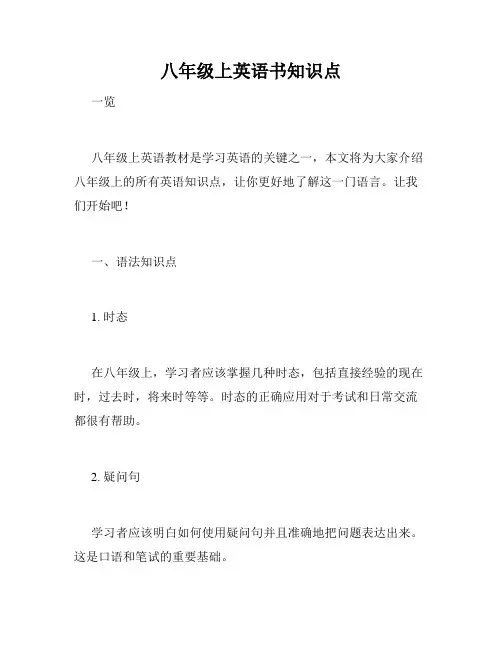
八年级上英语书知识点一览八年级上英语教材是学习英语的关键之一,本文将为大家介绍八年级上的所有英语知识点,让你更好地了解这一门语言。
让我们开始吧!一、语法知识点1. 时态在八年级上,学习者应该掌握几种时态,包括直接经验的现在时,过去时,将来时等等。
时态的正确应用对于考试和日常交流都很有帮助。
2. 疑问句学习者应该明白如何使用疑问句并且准确地把问题表达出来。
这是口语和笔试的重要基础。
3. 动词和介词常用动词和介词表达了英语语言意义的多样性和深度,它们应该在八年级上得到深入学习和理解。
4. 语态和虚拟语气学习者应该掌握正确使用语态,如主动和被动语态等,以及虚拟语气的使用。
二、单词和词汇知识点1. 基础词汇学习者应该学好基础词汇,在之后的学习中学到其他更复杂的英语单词和意思。
2. 成语和俚语成语和俚语在英语语言中很重要,它们可以丰富语言表达,但是学习者应该善于辨别这些词汇的意思和用法。
3. 词根和前后缀学习者应该注意单词中的词根和前后缀,并能够根据上下文推断出它们的意思。
三、阅读知识点1. 板块阅读技巧学习者需要学会如何分配自己的时间和控制阅读的速度,以便在时间充分的情况下完成阅读任务。
2. 大意推断和全文理解学习者需要学习如何推断文章的大意和全文理解,然后从中提取重要信息。
3. 阅读表达学习者要学习如何通过文字表达自己的观点和思想,并展示自己的阅读理解。
四、写作知识点1. 英语文章的基本引言和结论学习者应该掌握基础英文写作结构,并能够编写文章的引言和结论。
这是描述和表达英文文章中的重要组成部分。
2. 句法和语法学习者需要学习英文文章中复杂句型的运用,如引言,对比和对话。
句子应该结构明确,符合语法,否则会影响表达清晰度。
3. 表达方式和风格学习者要掌握多种表达方式和风格,从而编写清晰,完整和表达的语言。
五、口语和听力知识点1. 原声音频学习者应该借助音频来听力练习和口语训练,从而更好地提升自己的英语听力和口语水平。
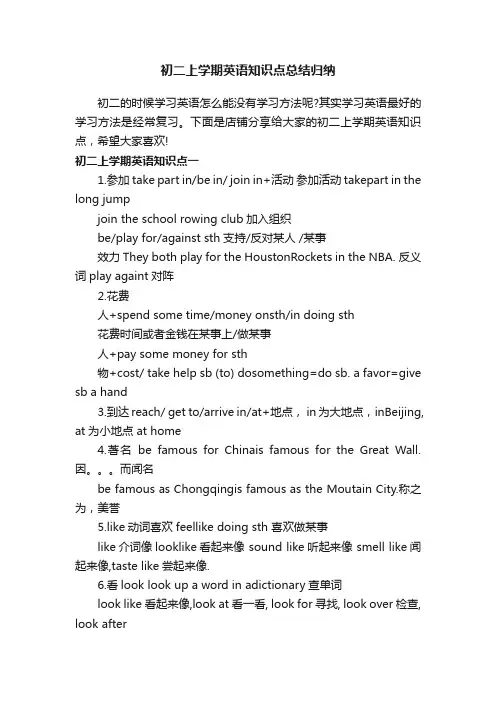
初二上学期英语知识点总结归纳初二的时候学习英语怎么能没有学习方法呢?其实学习英语最好的学习方法是经常复习。
下面是店铺分享给大家的初二上学期英语知识点,希望大家喜欢!初二上学期英语知识点一1.参加take part in/be in/ join in+活动参加活动 takepart in the long jumpjoin the school rowing club加入组织be/play for/against sth支持/反对某人 /某事效力They both play for the HoustonRockets in the NBA. 反义词play againt对阵2.花费人+spend some time/money onsth/in doing sth花费时间或者金钱在某事上/做某事人+pay some money for sth物+cost/ take help sb (to) dosomething=do sb. a favor=give sb a hand3.到达reach/ get to/arrive in/at+地点, in为大地点,inBeijing, at为小地点 at home4.著名be famous for Chinais famous for the Great Wall. 因。
而闻名be famous as Chongqingis famous as the Moutain City.称之为,美誉5.like动词喜欢feellike doing sth 喜欢做某事like介词像looklike看起来像 sound like听起来像 smell like闻起来像,taste like尝起来像.6.看look look up a word in adictionary查单词look like看起来像,look at看一看, look for寻找, look over检查, look after7.借I can lend you some tapes ofher songs. 主语借出We often borrow books from thelibrary.主语借进Can I borrow your bike?我能借你的自行车吗?=Can you lend me your bike?=Can you lend your bike to me? 你可以借你的车给我吗?8.照顾动词carefor the patients 照顾病人,名词take care of sb/oneself,形容词Becareful当心(反)careless9. 猜测Collecting stamps must begreat fun. 收集邮票想必很有趣。
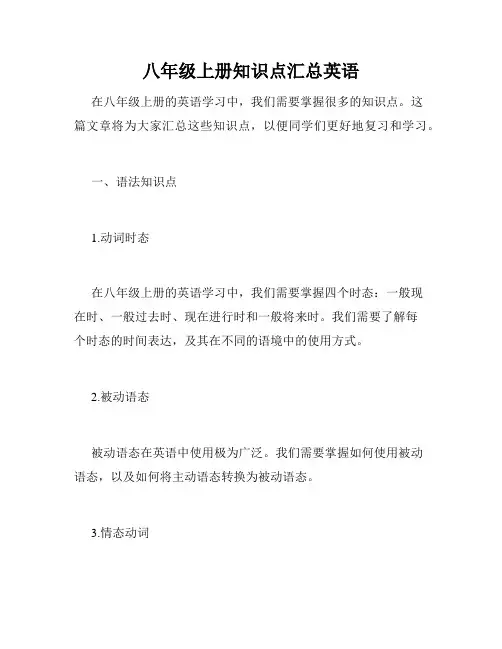
八年级上册知识点汇总英语在八年级上册的英语学习中,我们需要掌握很多的知识点。
这篇文章将为大家汇总这些知识点,以便同学们更好地复习和学习。
一、语法知识点1.动词时态在八年级上册的英语学习中,我们需要掌握四个时态:一般现在时、一般过去时、现在进行时和一般将来时。
我们需要了解每个时态的时间表达,及其在不同的语境中的使用方式。
2.被动语态被动语态在英语中使用极为广泛。
我们需要掌握如何使用被动语态,以及如何将主动语态转换为被动语态。
3.情态动词情态动词是一种特殊的动词形式,包括can、could、may、might、must、shall、should、will和would等。
我们需要了解每个情态动词的意义和用法。
4.虚拟语气虚拟语气用于表达可能的假设、愿望、虚拟的情况、建议等。
我们需要学会使用虚拟语气,并注意不同情况下的使用方式。
二、单词和词组知识点1.常用动词和形容词在八年级上册的英语学习中,我们需要掌握一些常用的动词和形容词。
例如:finish、like、enjoy、happy、sad、angry等。
这些单词经常出现在日常生活中,因此我们需要熟练掌握它们。
2.常用词组熟练掌握一些常用词组对于我们的英语学习是非常有帮助的。
例如:take care of、look forward to、work on、pay attention to等。
这些词组在我们的英语表达中使用频率较高,因此我们需要注意学习它们的用法。
3.其他单词和词组在八年级上册的英语学习中,我们还需要学习一些其他的单词和词组。
例如:transportation、entertainment、wildlife、historic sites、directions等。
这些单词和词组与生活中的各个方面相关,我们需要在学习它们的同时了解它们的实际意义和使用场合。
三、阅读理解知识点1.注意细节在进行阅读理解时,我们需要注意细节。
这包括阅读材料的文字表述、时间和地点等信息,以及与阅读内容相关的语言技能。
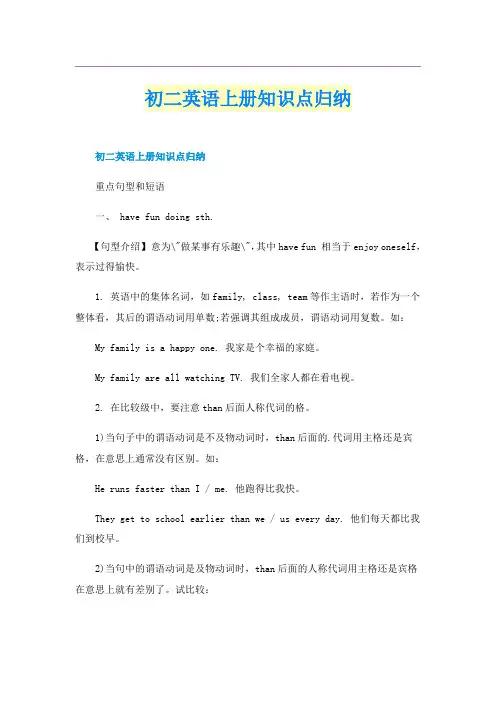
初二英语上册知识点归纳初二英语上册知识点归纳重点句型和短语一、 have fun doing sth.【句型介绍】意为\"做某事有乐趣\",其中have fun 相当于enjoy oneself,表示过得愉快。
1. 英语中的集体名词,如family, class, team等作主语时,若作为一个整体看,其后的谓语动词用单数;若强调其组成成员,谓语动词用复数。
如:My family is a happy one. 我家是个幸福的家庭。
My family are all watching TV. 我们全家人都在看电视。
2. 在比较级中,要注意than后面人称代词的格。
1)当句子中的谓语动词是不及物动词时,than后面的.代词用主格还是宾格,在意思上通常没有区别。
如:He runs faster than I / me. 他跑得比我快。
They get to school earlier than we / us every day. 他们每天都比我们到校早。
2)当句中的谓语动词是及物动词时,than后面的人称代词用主格还是宾格在意思上就有差别了。
试比较:I like you more than he. (=I like you more than he likes you.) 我比他更喜欢你。
I like you more than him. (=I like you more than I like him.) 你和他相比,我更喜欢你。
3. 不定式作定语时,应放在被修饰词的后面,一般指一个还没有发生的动作。
如:Do you have anything to say about this? 有关这件事你有没有什么要说的?4. 在比较句型中,than后面的谓语动词常常省略。
也可以用相应的助动词来代替与前面相同的谓语动词,以避免重复。
如:Tom does better at the lessons than I (do). 汤姆功课比我好。
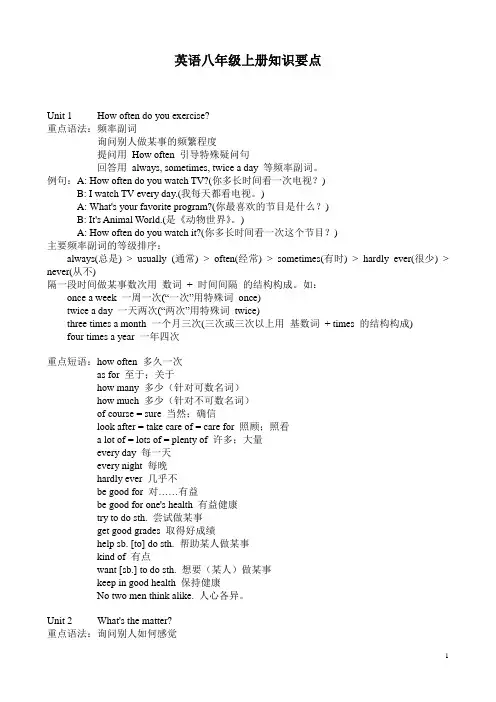
英语八年级上册知识要点Unit 1 How often do you exercise?重点语法:频率副词询问别人做某事的频繁程度提问用How often 引导特殊疑问句回答用always, sometimes, twice a day 等频率副词。
例句:A: How often do you watch TV?(你多长时间看一次电视?)B: I watch TV every day.(我每天都看电视。
)A: What's your favorite program?(你最喜欢的节目是什么?)B: It's Animal World.(是《动物世界》。
)A: How often do you watch it?(你多长时间看一次这个节目?)主要频率副词的等级排序:always(总是) > usually (通常) > often(经常) > sometimes(有时) > hardly ever(很少) > never(从不)隔一段时间做某事数次用数词+ 时间间隔的结构构成。
如:once a week 一周一次(“一次”用特殊词once)twice a day 一天两次(“两次”用特殊词twice)three times a month 一个月三次(三次或三次以上用基数词+ times 的结构构成)four times a year 一年四次重点短语:how often 多久一次as for 至于;关于how many 多少(针对可数名词)how much 多少(针对不可数名词)of course = sure 当然;确信look after = take care of = care for 照顾;照看a lot of = lots of = plenty of 许多;大量every day 每一天every night 每晚hardly ever 几乎不be good for 对……有益be good for one's health 有益健康try to do sth. 尝试做某事get good grades 取得好成绩help sb. [to] do sth. 帮助某人做某事kind of 有点want [sb.] to do sth. 想要(某人)做某事keep in good health 保持健康No two men think alike. 人心各异。
八年级上册英语重点知识点英语重点学问点一、重点短语1. on time2. best wishes3. give a talk4. for example5. short for6. a waste of time7. go on a field trip8. go fishing9. I agree10. next week11. the day after tomorrow12. have a picnic13. have some problems doing sth.14. go the wrong way15. hurry up16. get together17. in the open air18. on Mid-Autumn Day19. come over20. have to21. get home22. agree with23. in the country24. in town25. all the same26. in front of27. on the left/right side28. next to29. up and down30. keep healthy31. grow up32. at the same time33. the day before yesterday35. last Saturday36. half an hour ago37. a moment ago38. just now39. by the way40. all the time41. at first二. 重要句型1. have fun doing sth.2. Why dont you?3. Were going to do sth.4. start with sth.5. Why not?6. Are you going to?7. be friendly to sb.8. Youd better do sth.9. ask sb. for sth.10. say goodbye to sb.11. Good luck(with sb)!三. 交际用语1.Welcome backto school!2.Excuse me. Im sorry Im late, because the traffic is bad.3.It doesnt matter.4.Happy Teachers Day !5.Thats a good idea.6.What are you going to do?7.Where are we going ?8.What are we going to do ?9.Im good at10.Its not far from11. Are you free tomorrow evening?12.Would you and Lily like to come over to my home for Mid-Autumn Festival?13.Im glad you can come.14.Thanks for asking us.15.How about another one?16.May I have a taste?17.Let me walk with you.18.What do you have to do?19.Do you live on a farm?20.Which do you like better, the city or the country?21.Which do you like best, dogs, cats or chickens?22.Shall we go at ten? Good idea!23.---Lets make it half past one. ---OK.24.---Why not come a little earlier? ---All right.25.Excuse me. Wheres the nearest post office, please?26.Its over there on the right.27.Im sorry I dont know.28.Youd better29.Thank you all the same.30.Which bus do I take?31.Go along this road.32.What day was it yesterday?33.Im sorry to hear that.34.I hope youre better now.35.Why did you call me?36.I called to tell四. 重要语法1.be going to的用法;2.形容词的比拟级、最高级;3.形容词和副词的比拟4.一般过去时五.重要学问点讲解1. on the street / in the street表示在街上时,on the street 和in the street 都可以,在美国多用on the street, 在英国多用in the street. 例如:We have a house in the street. 我们在街上有座房子。
八年级上册英语重点语法归纳一、一般过去时。
1. 概念:表示过去某个时间发生的动作或存在的状态。
2. 标志词:yesterday(昨天), last week(上周), last month(上个月), last year(去年), two days ago(两天前), in 1990(在 1990 年)等。
3. 构成:- 主语 + was / were + 其他(主语是第一人称 I 和第三人称单数用 was,其他人称用 were)- 主语 + 动词的过去式 + 其他。
4. 动词过去式的构成规则:- 一般在动词末尾加 -ed,如:play - played。
- 结尾是 e 的动词加 -d,如:like - liked。
- 重读闭音节词,双写末尾辅音字母再加 -ed,如:stop - stopped。
- 以辅音字母 + y 结尾的动词,变 y 为 i 再加 -ed,如:study - studied。
二、频度副词。
1. 常见的频度副词有:always(总是), usually(通常), often(经常), sometimes(有时), seldom(很少), never(从不)2. 频度副词在句中的位置:通常放在实义动词之前,be 动词、助动词或情态动词之后。
三、形容词和副词的比较级和最高级。
1. 比较级的构成规则:- 一般在词尾加 -er。
- 以不发音的 e 结尾的词加 -r。
- 重读闭音节词,双写末尾辅音字母再加 -er。
- 以“辅音字母 + y”结尾的词,变 y 为 i 再加 -er。
- 多音节词和部分双音节词在前面加 more。
2. 最高级的构成规则:- 一般在词尾加 -est。
- 以不发音的 e 结尾的词加 -st。
- 重读闭音节词,双写末尾辅音字母再加 -est。
- 以“辅音字母 + y”结尾的词,变 y 为 i 再加 -est。
- 多音节词和部分双音节词在前面加 most。
3. 比较级和最高级的用法:- 比较级用于两者之间的比较,常用 than 连接。
八年级英语上册知识点归纳故有知识的人,道义上有为后者代言的义务。
人最容易丧失的是同情心,而杜甫就是一个正面例子。
下面小编给大家分享一些八年级英语上册知识点归纳,希望能够帮助大家,欢迎阅读!八年级英语上册知识点1I’m going to study computer science.【重点词语/短语用法解析】1.want to be/become + (职业)名词:“想要成为…..”I want to be (be) a scientistwhen I grow up.2.write stories 写故事tell stories 讲故事3.keep on doing sth. 继续做某事(表动作的反复)keeping doing sth. 保持做某事(表动作或状态的持续)4. besure about +名/代/V-ing“肯定”Are you sure about that?make sure (that)+从句“…...确保...…”Make sure that both doors are closed whenyou go out.5.learn sth. We must learn English every day.learn to do sth. I amgoing to learn to play ( play) the piano.6. discuss v. 讨论;商量名词是discussiondiscuss with sb. 与某人讨论 :Discuss this question with yourpartner.Let’sdiscuss this problem. 让我们讨论一下这个问题。
All we need now is action, not discussion. 我们现在需要的是行动,不是讨论。
7. beable to do sth. 能够做某事(1)can : can+动词原形,无人称和数的变化。
八年级上册英语全部知识点八年级英语是一个重要的阶段,这个阶段主要通过学习英语语法,掌握基础词汇和语言技能,提高对英语的理解能力和运用能力。
下面是八年级上册英语全部的知识点:语法1. 现在进行时:be+现在分词- 表示现在正在发生的动作- 常用时间状语:now, at the moment等2. 过去时:动词过去式- 表示过去发生的动作- 常用时间状语:yesterday, last week等3. 一般将来时:will+动词原形- 表示将要发生的动作- 常用时间状语:tomorrow, in the future等4. 情态动词- can/could, may/might, will/would, shall/should, must等- 表示能力、推测、意愿、命令、必须等情态5. 被动语态- be+过去分词- 表示动作的承受者是主语,强调动作的结果而非动作的执行者6. 宾语从句- 引导词包括that, if, whether, how等- 在句中作宾语7. 定语从句- 引导词包括that, which, whose, who等- 在句中修饰名词或代词词汇1. 常用动词- be, have, do, go, take, make, come等2. 易混淆词汇- good/well, bad/badly, usually/often等- 意义相近的单词3. 常用名词- person, place, thing, time等4. 常用形容词- big, small, tall, short, interesting, boring等5. 常用副词- slowly, fast, loudly, softly, well等语言技能1. 听力- 听懂基础日常英语对话和简单文章- 通过听写、跟读等训练来提高听力水平2. 口语- 练习日常英语对话,提高口语表达能力- 练习独白和演讲,提高流利度和语感3. 阅读- 阅读简单的英语文章,掌握基础单词和表达方式- 阅读英文小说和资料,提高阅读理解能力4. 写作- 练习书写英文单词和句子,提高写作质量- 练习写作各类文章,如日记、信件、作文等以上就是八年级上册英语全部知识点。
初二英语知识点总结归纳上册人教版一、语法知识点。
1. 一般现在时。
- 概念:表示经常或习惯性的动作或状态,也可表示客观事实或普遍真理。
- 结构:- 主语 + be动词(am/is/are)+ 其他。
例如:I am a student.- 主语(非第三人称单数)+ 动词原形 + 其他。
例如:They play football every day.- 主语(第三人称单数)+ 动词第三人称单数形式(一般在动词原形后加 -s或-es)+ 其他。
例如:He likes reading.- 标志词:often, usually, always, sometimes, every day/week/month等。
2. 形容词的比较级和最高级。
- 比较级的构成:- 一般在形容词后加 -er。
例如:tall - taller。
- 以不发音的e结尾的形容词,加 -r。
例如:nice - nicer。
- 以重读闭音节结尾且末尾只有一个辅音字母的形容词,双写这个辅音字母再加-er。
例如:big - bigger。
- 以“辅音字母 + y”结尾的形容词,把y变为i再加 -er。
例如:heavy - heavier。
- 不规则变化:good/well - better; bad/ill - worse; many/much - more 等。
- 比较级的用法:- 表示两者之间的比较,常用结构“比较级+than”。
例如:He is taller than me.- 最高级的构成:- 一般在形容词后加 -est。
例如:tall - tallest。
- 以不发音的e结尾的形容词,加 -st。
例如:nice - nicest。
- 以重读闭音节结尾且末尾只有一个辅音字母的形容词,双写这个辅音字母再加-est。
例如:big - biggest。
- 以“辅音字母 + y”结尾的形容词,把y变为i再加 -est。
例如:heavy - heaviest。
初二英语上册知识点归纳总结!一. 形容词/副词的比较级和最高级1. 形容词/副词的比较级和最高级的构成规则(1)单音节词和少数以-er,-ow结尾的双音节单词,比较级在后面加-er,最高级在后面加-est。
①单音节单词small→smaller→smallestshort→shorter→shortesttall→taller→tallestgreat→greater→greatest②少数以-er,-ow结尾的双音节单词clever→cleverer→cleverestnarrow→narrower→narrowest(2)以不发音e结尾的单音节单词,比较级在原形后加-r,最高级在原级后加-st。
large→larger→largestnice→nicer→nicestable→abler→ablest(3)以一个辅音字母结尾的闭音节(即:辅音+元音+辅音)单词中,先双写末尾的辅音字母,比较级加-er,最高级加-est。
big→bigger→biggesthot→hotter→hottestfat→fatter→fattest(4)以“辅音字母+y”结尾的双音节词,把y改为i,比较级加-er,最高级加-est。
easy→easier→easiestheavy→heavier→heaviestbusy→busier→busiesthappy→happier→happiest(5)其他双音节词和多音节词,比较级在前面加more,最高级在前面加most。
beautiful→more beautiful→most beautifuldifferent→more different→most differenteasily→more easily→most easily(6)有少数形容词、副词的比较级和最高级是不规则的,必须熟记。
good→better→bestwell→better→bestbad→worse→worstill→worse→worstold→older/elder→oldest/eldestmany/much→more→mostlittle→less→leastfar →further/farther→furthest/farthest2. 形容词和副词比较级的用法(1)“甲+be+(倍数)+形容词比较级+than+乙”表示“甲比乙…”或“甲比乙…几倍”。
初二英语上知识点Module one短语a new term 一个新学期give you some advice 给你一些建议 a piece of advice 一条建议write down your mistakes in your notebook在笔记本上写下你的错误check your vocabulary notebook every day 每天复习单词本read a newspaper in English 读英语报纸write email messages to each other 给彼此写邮件meet my pen friend 见我的笔友help me with my homework 帮助我的家庭作业ask for advice 询问建议improve my English 提高我的英语three basic questions 三个基本问题enjoy watching English films 喜欢看英语电影a great way to learn English 一个学习英语的好方法enjoy yourself 玩的快乐a foreign teacher 一个外国老师start a conversation 开始谈话take a deep breath 深呼吸remember all the new words 记住所有的新单词forget them quickly 很快忘记它们pieces of paper 几张纸speak to her 和她讲话句型1.why don’t you write it down? Why don’t +主语+动词原形?表示询问建议。
翻译:为什么我们不去参观长城呢?他为什么不参加这个活动?2.you should write down your mistakes in your notebooks. Should +动词原形表示应该做某事翻译:我们应该保护地球她不应该花那么多钱买衣服。
What should I do?3.try not to translate every word.Try to +动词原形或try not to +动词原形表示努力做某事或不做某事翻译:我尽最大努力去学好英语。
在晚餐时,不要尽力吃太多食物。
4.it’s a good idea to check your vocabulary notebook every day.It’s sometimes hard to understand American and Britishaccents.It +is +形容词+for sb +to do sth表示做某事对某人怎样,形容词是修饰事情的。
如果形容词是修饰人的品质的,for sb 要改为of sb 翻译:it’s interesting for me to read some jokes.It’s very kind of you to help me with my homework.5.It takes a long time to buy a ticket to Beijing.It +takes +for sb+ time+ to do sth 某人花费时间去做某事翻译:我花费了2个小时去打篮球他花了一天去给他妈妈买礼物6.Enjoy oneself 玩的开心Enjoy myself enjoy themselves enjoy yourself enjoy ourselves7. how about doing sth ? how about sth?How about counting the English words?How about a cup of coffee?Module two短语:Visit China 拜访中国Send her a DVD about China 送她一个有关中国的DVDWant to travel around the world 想周游世界Invite me to stay with her 邀请我与她在一起The price of the ticket 票的价格Take off 起飞;脱下The first prize 一等奖Enter a competition 参加竞赛enter=take part inAll over China 全中国Fly to different places 飞到不同的地方Have Italian food 吃意大利食物Sell out 卖光The greatest Chinese musician 中国最伟大的音乐家At the end 最后Roast duck 烤鸭See Beijing opera 看北京京剧Climb the Great Wall 爬长城Visit the Palace Museum 游览故宫句型:1.I have been to Shanghai. 主语+have/has+动词的过去分词+名词或代词是现在完成时的句型结构,表示某人已经做过了某事。
Has 是第三人称单数时使用。
现在完成时态的句子里一般都会有,already, yet before, for +一段时间,since +时间点,so far, by now 等表示时间的词或短语。
Astronauts have already been to the moon.The scientists haven’t heard from it yet.I have lived here for 10 years.I have been in this school since 2000.I have stayed in the hotel for a week by now.She has remembered 3000 English words so far.She has visited China before.2.Sally has invited me to stay with her.Invite sb +to do sth ; invite sb +to some place表示邀请某人做某事,邀请某人去某地3.i like San Francisco very muc h because there’s a lot to see and do there.Her father is an Air China captain, so they fly to different places for their holidays.句子+because 从句;句子+so+从句前者表示原因,后者表示结果,这是复杂句型的结构。
Module 3短语Space station space travel on the space station The latest newsSend a spacecraft to MarsOn the newson businessmillions of yearshave an environment with airthe solar systemin the universein spacediscovery lifesend information to uslook at other planetslife on the moona visit to the space stationa real astronaut句型1.Have you heard the latest news?Some scientists have sent a spacecraft to Mars.现在完成时时态,表示已经做过了某事,即事情的完成,构成结构是主语+have/has+动词过去分词一般疑问句就是把have/has 提到主语的前面。
2.It has taken several months to get there.Take表示花费:句型结构是it +takes +(sb)+time+ to do sth.它的完成时态形式。
将来时态的结构是:it will take sb time to do sth;过去式结构是:It took sb time to do sth。
句子结构的意思是:某人花费了多少时间来做某事。
注意:它的主语必须是it, 如果是人,可以改成另一种结构即:sb spend time doing sth.It takes me two hours to go to school.It took him 7 hours to go to Beijing.It will take us 3 hours to go to Hangzhou.It has taken them 4 hours to finish the job.We spend 3 hours going to Hangzhou.3.Have the astronauts discovered life on Mars?Discover 表示发现,即世界上本来就有的让人发现的。
Find 表示发现的结果Find out 表示意识到Invent 表示发明,世界上本来没有的,人类发明的。
4.They take the space shuttle, and go there and back. Take 表示乘坐,take a bus, take a train, take a subway, takea taxi.5.cost; pay for; take; spend都表示花费,cost 主语是物,pay for 主语是人,take 主语是it, spend 主语是人。
The football costs me 300yuan.We pay 300yuan for the football.6.Scientists think that there has been life on Earth for millions of years.There be 结构,表示在哪里有什么事物。
它的完成时态表示在那里早就有什么事物。
There has been +名词+地点。
Life 在这里表示生命,不是生活。
There has been cars in the USA.7.None of them has an environment with air, so people and things cannot grow.None of +主语+动词的第三人称单数No one has discovered any life in space yet.No one 只能表示人,没有人。